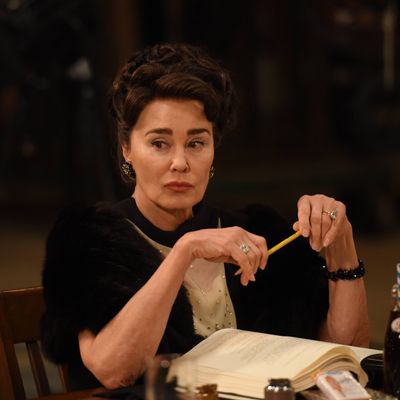
After the gorgeously shot and deliciously catty Bette and Joan showdown at the 1963 Oscars, which revealed caverns of vulnerability lying underneath their Hollywood personas, the follow-up hour is a bit lackluster. The episode centers on Bob bringing Joan and Bette back together for another hag horror film ÔÇö the genre has taken off, thanks to them ÔÇö and the ladies agreeing only because theyÔÇÖre out of options. If you think it sounds exactly like the lead-up to What Ever Happened to Baby Jane?, well, youÔÇÖre right. ItÔÇÖs all a little too d├®j├á vu to make for a compelling episode (obviously, it ends up very different, but weÔÇÖre talking about the hour at hand for now).
The biggest issue with ÔÇ£Hagsploitation,ÔÇØ though, is pulling focus from the premise of the show. The best scenes of the episode ÔÇö and the entire series, really ÔÇö are the ones in which Bette and Joan are left alone to duke it out. Stanley Tucci is excellent as the callous, ill-tempered Jack Warner, but, like, I know heÔÇÖs a dick ÔÇö I donÔÇÖt need to see him mistreating his employees. Alfred MolinaÔÇÖs Bob Aldrich is wonderful, but his divorce story line, though sad, takes away from the precious little Bette-and-Joan time we are given. Even JoanÔÇÖs solo story with her brother, although it further illuminates the origin of JoanÔÇÖs insecurities and neediness, feels bloated (donÔÇÖt get me wrong, Jessica Lange should win all the awards for this role). The episode seems to forget that itÔÇÖs Lange and Susan SarandonÔÇÖs fiery relationship, whether theyÔÇÖre in the same room or simply fuming about the other elsewhere, that makes this show work.
The big 1963 Oscars confrontation has come and gone, and Joan is keeping her career alive thanks to another horror film, Strait-Jacket, but she isnÔÇÖt happy about it. Her director, William Castle (welcome, John Waters!), is all about playing up the campy horror gimmicks, and Joan is decidedly not. Hey, at least that ax she has to swing around while on the premiere tour matches her dress, right?
Joan looks broken. SheÔÇÖs tending to her loneliness and humiliation via alcohol and throwing things at MamacitaÔÇÖs head. You know things are really bad when Mamacita is threatening to leave.
As if things couldnÔÇÖt get any worse: Hedda shows up with some bad news and some worse news. She has a fatal heart defect. Her speech about the end of her career and how proud she is of crushing the careers of people she deemed less-than-moral is a surprising whopper. Speaking of awards, Judy Davis and her hats will be winning a whole bunch, too, right?
Anyway, just as Joan is beginning to mourn her friendÔÇÖs misfortune, Hedda drops a bomb: ThereÔÇÖs a rumor going around that someone has a ÔÇ£stagÔÇØ film (read: porno) of Joan from her younger days. HeddaÔÇÖs going to give Joan the chance to tell her side of the story. ItÔÇÖll be HeddaÔÇÖs last great scoop. Of course Joan promptly denies the whole thing, kicks her dying friend out, and goes to visit the person she knows must be behind the whole thing: her older brother, Hal.
JoanÔÇÖs relationship with her brother is, um, not great. He wants to remind Joan that under all of her furs, sheÔÇÖs just like him. HeÔÇÖs also harboring a grudge over JoanÔÇÖs treatment of their mother ÔÇö he claims Joan brought her to California and was cruel to her in her final days, not allowing her to eat with JoanÔÇÖs children, making her use the servantsÔÇÖ entrance, etc. But weÔÇÖve heard how JoanÔÇÖs mother treated Joan growing up, so no one is faultless here. Joan is willing to pay Hal off with most of the money she has left ÔÇö but he ends up dying during an appendectomy surgery before he cashes it. You want insight into who Joan really is? Upon hearing about the death of her brother, the first thing she does is grab a drink and make a phone call to cancel that check she handed over. Real cold, Joanie.
How does a woman who repeatedly claims to be strapped for money find enough to pay her brother to get rid of her porno? The girl has to work. So, when Bob Aldrich shows up with a part for Joan in his new film, What Ever Happened to Cousin Charlotte?, she eventually has to say yes ÔÇö even if it is the last thing she wants to do.
It takes a lot of prodding from Bob to coax both Joan and Bette to join his film, especially once he informs them that the rivals would have to work together again. I believe BetteÔÇÖs exact words when she hears the news are: ÔÇ£I wouldnÔÇÖt piss on Crawford if she were on fire.ÔÇØ So, thereÔÇÖs that.
However, they canÔÇÖt overlook the opportunity to re-create the magic of Baby Jane. Obviously, Joan has her hush money problems, and Bette has had such a lack of film offers that sheÔÇÖs had to take, ugh, TV roles. Neither Joan nor Bette want to make the mistakes they did the last time. If they have to sign on to the picture, they might as well get everything they deserve. For Joan, that means top billing and money upfront (ÔÇ£Every time I agree to a backend, thatÔÇÖs exactly where I end up getting it.ÔÇØ); for Bette itÔÇÖs creative control. Bette and Joan are coming for whatÔÇÖs theirs this time around.
Bob and his new studio head, Darryl Zanuck (Bob dicks over Jack Warner and gives the movie to WarnerÔÇÖs rival as a way to stick it to the guy. Yes, Bob, we can hear your newly returned balls clanking), give the girls what they want, and thus we arrive back on a studio lot for a Bette and Joan showdown.
They meet in the studio parking lot for the first time since the Oscars. You remember that fire between Lange and Sarandon I was talking about? This scene is oozing in it. JoanÔÇÖs pretending to want a fresh start with Bette, while Bette asks if she can use JoanÔÇÖs gift of a box of matches to set Joan on fire. After all thatÔÇÖs out of the way, Bette does have an offer for Joan: She wants them to work together. ItÔÇÖs the only way theyÔÇÖll get everything that Bob promised them. They need to be a united front. Joan agrees to be BetteÔÇÖs ally.
Well, that truce lasts all of 30 seconds. As Bette rips on BobÔÇÖs script during the table read, Joan offers little help. Bette starts to complain about her notes not being taken into consideration, especially ones about removing some of the silly gore and replacing it with strong character development. ÔÇ£ThereÔÇÖs a thin line between art and trash,ÔÇØ she reminds Bob, and she uses JoanÔÇÖs latest film as an example. That there is the last straw for Joan. Things escalate, and Bette ends up walking out until there are changes.
Some of those changes mustÔÇÖve been made, because before too long Bette and Bob are down in Louisiana getting started on Cousin Charlotte. Bob confesses to Bette that he and Harriet are getting a divorce, and the director and his star seem closer than ever. ÔÇ£WeÔÇÖll be alone together,ÔÇØ she says to comfort a heartbroken Bob. Bette is an excellent resource for getting through a divorce ÔÇö after all, she reminds Bob, sheÔÇÖs had four of them.
This growing friendship does not sit well with Joan. She arrives in Louisiana after production is under way, only to find that sheÔÇÖs been all but forgotten. ThereÔÇÖs no one there to greet her at the airport or take her to the hotel, and when she does make it to the hotel, thereÔÇÖs no room for her. Enter Bette, a friend to hotel concierges across America. She helps fix the missing room problem for Joan and then runs off to sip on Champagne while Joan is forced to wait around to be taken care of.
As Mamacita astutely points out, Bette is enjoying JoanÔÇÖs obvious discomfort. Add it to MamacitaÔÇÖs growing list of reasons why Joan should pull out of this movie. Once JoanÔÇÖs brother dies and Joan doesnÔÇÖt have such an urgent need for money, Mamacita begs her to quit ÔÇö the last time was awful for everyone. But Joan wonÔÇÖt. If sheÔÇÖs not working, she ÔÇ£might as well be dead.ÔÇØ She needs this picture, even if she doesnÔÇÖt want it.
Joan finally gets to her room and vows to make the best of a less-than-ideal situation. She calls up Bob to inform him of her arrival and hears Bette in the background pouring her director a glass of that Champagne, having a lovely time without Joan. Joanie is not amused. Fingers crossed it leads to some forward momentum.


